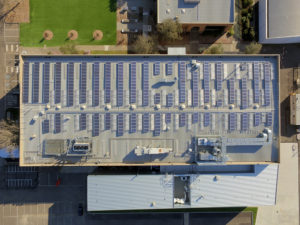
RMIT has committed to a $128 million plan to cut energy and water use and greenhouse gas emissions – the biggest program of its kind in the southern hemisphere.
RMIT is working with Siemens and Honeywell, who identified opportunities for energy and water savings in 77 buildings in the City, Bundoora and Brunswick campuses.
The Sustainable Urban Precincts Program (SUPP) will reduce electricity use over eight years by an estimated 263 million kilowatt hours, leading to an annual 32,000-tonne reduction in greenhouse gas emissions. Water use will be cut by an estimated 53 million litres per year.
An integrated approach to investment in capital and operational requirements will provide improved mechanical infrastructure condition, increased operational efficiencies and achieve desirable sustainability outcomes.
The SUPP at RMIT is a “once in a generation” opportunity for the University to achieve a fundamental shift in momentum toward sustainability.
Savings Narrative:
The Sustainable Urban Precincts Program (SUPP) in part was developed from the former Victorian Greener Government Buildings program. RMIT began a 4 year partnership with Honeywell and Siemens to design and install Energy Conservation Measures across the RMIT City, Bundoora and Brunswick campuses. The program is delivered under an Energy Performance Contract model and also includes an unprecedented investment of $4.8 million in sustainability-focused Learning, Teaching and Research projects.
The program includes:
• Installation of a 3.2MW co-generation plant on the City Campus to generate precinct scale electricity and heating hot water,
• Installation of a 1.2MW tri-generation plant on the Bundoora Campus to generate precinct scale electricity, chilled water and heating hot water.
• 40,000 LED light fittings installed across all three campuses.
• 92kW solar PV installation at the RMIT Bundoora cCampus
• Installation of multiple high efficiency boilers and chillers
• Optimisation of air conditioning systems across all three campuses
• Water efficient fixtures across all three campuses
• Water harvesting, storage and irrigation
• Sub-metering, and dashboards captured through Building Management System upgrades.
The program is on track to deliver an annual 32,000-tonne annual reduction in greenhouse gas emissions. This reduction is the equivalent to planting an area the size of the Melbourne CBD with 136,000 trees every year. A video outlining the SUPP targets and accomplishments is available online: https://www.youtube.com/watch?v=d_9M5moVcCo
Guaranteed utility savings come from reductions in electricity, natural gas and water consumption, with additional savings to be derived from tariff changes, demand reductions, maintenance, annual capital cost avoidance.
The guaranteed utility savings are underpinned by a comprehensive measurement and verification approach. Measurement and verification plans were developed in alignment with the International Performance Measurement and Verification Protocol to ensure certainty, validity and transparency of the savings delivered. Utilising a measurement and verification approach consistent with the international protocol strengthens the partnership between the energy savings companies and RMIT by ensuring measurements are taken objectively and providing for certainty in methodology and calculation.
It should be noted that although the guaranteed savings period is only eight years, RMIT will continue to realise savings from utility bills long after this period. The SUPP initiatives give RMIT the ability to continue to measure and verify the performance of its buildings to determine the long-term benefit of the SUPP, even after the guaranteed savings period has finished.
In addition to the direct savings realised by the SUPP via the guaranteed utility savings, RMIT is also reducing its backlog maintenance by approximately $95M via asset upgrades. The backlog maintenance savings were not accounted for in the original payback period, therefore the savings to RMIT exceed those provisioned for in the guaranteed utility savings.
The SUPP Learning & Teaching and Research projects are enabling RMIT University to leverage academic opportunities as a result of the SUPP implementation and showcase RMIT as a living laboratory of sustainability.
RMIT has committed $4.8 million to world–leading, innovative, collaborative projects that embed sustainability across the core business of the University, delivering strategic outcomes for schools and research areas.
The scope of the Learning & Teaching and Research Projects related to the Sustainable Urban Precincts Program covers the following components:
• Five Learning and Teaching projects
• Six interdisciplinary research projects
• Ten PhD scholarships
• An interactive building dashboard software solution
• Industry Engagement – regular forums, careers events and networking for students